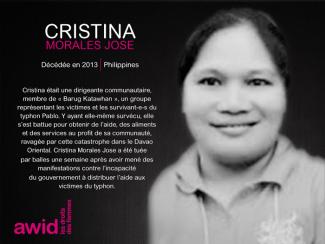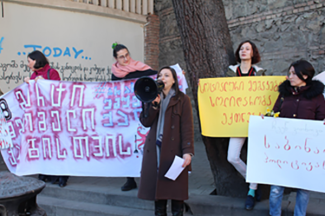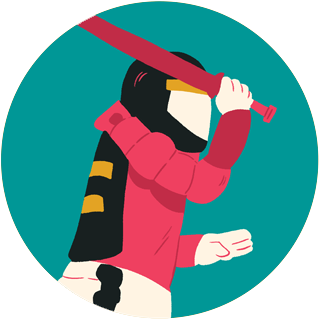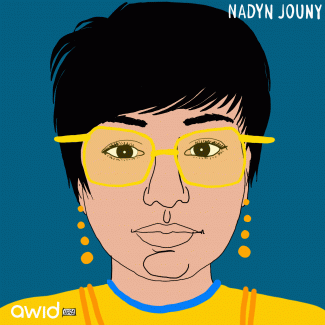
Cristina Morales Jose

WHRDs are self-identified women and lesbian, bisexual, transgender, queer and intersex (LBTQI) people and others who defend rights and are subject to gender-specific risks and threats due to their human rights work and/or as a direct consequence of their gender identity or sexual orientation.
WHRDs are subject to systematic violence and discrimination due to their identities and unyielding struggles for rights, equality and justice.
The WHRD Program collaborates with international and regional partners as well as the AWID membership to raise awareness about these risks and threats, advocate for feminist and holistic measures of protection and safety, and actively promote a culture of self-care and collective well being in our movements.
WHRDs are exposed to the same types of risks that all other defenders who defend human rights, communities, and the environment face. However, they are also exposed to gender-based violence and gender-specific risks because they challenge existing gender norms within their communities and societies.
We work collaboratively with international and regional networks and our membership
We aim to contribute to a safer world for WHRDs, their families and communities. We believe that action for rights and justice should not put WHRDs at risk; it should be appreciated and celebrated.
Promoting collaboration and coordination among human rights and women’s rights organizations at the international level to strengthen responses concerning safety and wellbeing of WHRDs.
Supporting regional networks of WHRDs and their organizations, such as the Mesoamerican Initiative for WHRDs and the WHRD Middle East and North Africa Coalition, in promoting and strengthening collective action for protection - emphasizing the establishment of solidarity and protection networks, the promotion of self-care, and advocacy and mobilization for the safety of WHRDs;
Increasing the visibility and recognition of WHRDs and their struggles, as well as the risks that they encounter by documenting the attacks that they face, and researching, producing, and disseminating information on their struggles, strategies, and challenges:
Mobilizing urgent responses of international solidarity for WHRDs at risk through our international and regional networks, and our active membership.

Zita fue una activista por los derechos de las mujeres que defendió los derechos de las mujeres rurales en el Gran Kivu.
Fue la primera directora ejecutiva de UWAKI, una organización de mujeres muy conocida. A través de su trabajo con la Red de Mujeres por los Derechos y la Paz (RFDP) y el Foro de Mujeres por la Paz de Kivu del Sur, dedicó su vida a ayudar a restablecer la paz en la zona oriental de la República Democrática del Congo. Se manifestó firmemente en contra del uso de la violencia sexual como arma de guerra.
En 2006, se propuso como candidata en las primeras elecciones democráticas del país. Aunque no ganó, siguió defendiendo los derechos de las mujeres y la comunidad de Kivu del Sur la recuerda con cariño.

Ключевая цель исследования – осветить финансовое положение различных феминистских движений, инициатив за права женщин, гендерную справедливость, ЛГБТКИ+ и смежных движений по всему миру и, основываясь на этом, еще больше усилить аргументы в пользу увеличения объема денежных средств и передачи власти феминистским движениям.

Nous constatons une implication sans précédent des acteurs anti-droits dans les espaces internationaux consacrés aux droits humains. Pour être plus efficaces et plus audibles, les acteurs anti-droits œuvrent à la constitution d’alliances tactiques qui regroupent différents secteurs et confessions et franchissent les frontières régionales et nationales.
Cette « alliance impie » entre des acteurs traditionalistes issus de milieux catholiques, évangéliques, mormons, orthodoxes russes et musulmans s’est construite autour d’une cause commune qui se concrétise dans un certain nombre de thèmes de discussion et d’efforts communs de plaidoyer visant à réduire à néant les progrès obtenus par les féministes en matière de droits sexuels au niveau international.
Activités clés : en tant que gouvernement de l’Église catholique romaine, le « Saint-Siège » utilise son statut unique d’État observateur permanent auprès de l’ONU pour faire pression en faveur de visions conservatrices, patriarcales et hétéronormatives de la féminité, de l’identité de genre et de la « famille ». Il promeut des politiques anti-avortement et anti-contraception.
Basé à : la Cité du Vatican, Rome, Italie.
Affiliation religieuse : catholique.
Connexions avec d’autres acteurs anti-droits : groupes chrétiens américains ; alliances interreligieuses orthodoxes ; OSC catholiques.
Activités clés : l’OCI se définit comme la « voix collective du monde musulman » et agit comme un bloc d’États au sein des Nations Unies. Elle tente d’ouvrir des brèches dans le système de protection des droits humains en s’appuyant sur des références à la religion, à la culture ou à la souveraineté nationale. Elle promeut le concept de « famille traditionnelle » et contribue à la mise en place d’un régime parallèle de droits humains doté d’un caractère plus restrictif (voir par exemple la Déclaration du Caire de 1990 sur les droits humains dans l’Islam).
Basé à : Djeddah, Arabie Saoudite.
Affiliation religieuse : musulmane.
Connexions à d’autres acteurs anti-droits : missions des États ultraconservateurs auprès de l’ONU, par exemple la Russie.
Activités clés : conférences internationales et régionales ; production et diffusion de recherches et de connaissances ; lobbying auprès des Nations Unies pour « défendre la vie, la foi et la famille ».
Basé à : Rockford, Illinois, États-Unis.
Affiliation religieuse : prédominance catholique et chrétienne évangélique.
Connexions à d’autres acteurs anti-droits : le Sutherland Institute, un groupe de réflexion conservateur ; l’Église des Saints des Derniers Jours ; le département de la famille et de la vie de l’Église orthodoxe russe ; les prêtres catholiques anti-avortement et pro-vie ; la Fondation pour la culture et le patrimoine africains ; la Fédération polonaise des mouvements pro-vie ; la Fédération européenne des associations de familles catholiques ; le Comité des ONG de l’ONU sur la famille ; le Réseau politique pour les valeurs ; la Société démographique géorgienne ; des parlementaires polonais, moldaves, etc. ; FamilyPolicy ; l’Institut russe d’études stratégiques ; HatzeOir ; C-fam ; et d’autres encore.
Activités clés : lobbying auprès des Nations Unies, en particulier auprès la Commission de la condition de la femme, pour la « défense de la vie et de la famille » ; diffusion d’informations diverses (par ex. les bulletins faxés du vendredi) ; travail de construction du mouvement ; formations à l’intention des militants conservateurs.
Basé à : New York et Washington D.C., États-Unis.
Affiliation religieuse : catholique.
Connexions avec d’autres acteurs anti-droits : l’International Youth Coalition (Coalition internationale de la jeunesse) ; l’Alliance mondiale pour la jeunesse ; Human Life International ; le Saint-Siège ; coordination de la Civil Society for the Family ; le Family Research Council (États-Unis) et d’autres OSC anti-droits chrétiennes/catholiques ; délégation des États-Unis auprès de la CSW.
Activités clés : lobbying dans les espaces internationaux consacrés aux droits humains pour des politiques pro-famille, anti-LGBT*Q et anti-ESC (éducation sexuelle complète) ; formations à l’intention des acteurs de la société civile et des délégués d’États membres (par exemple « Le Guide des ressources sur la langue consensuelle des Nations Unies sur les questions familiales ») ; diffusion d’informations ; production de savoirs et d’analyses ; campagnes en ligne.
Basé à : Gilbert, Arizona, États-Unis.
Affiliation religieuse : Mormone.
Connexions avec d’autres acteurs anti-droits : en charge du Caucus sur les droits de la famille à l’ONU ; C-fam ; JONAH (Juifs offrant de nouvelles alternatives à l’homosexualité)[Béné1] ; NARTH, l’Association nationale pour la recherche et la thérapie de l’homosexualité (USA) ; le Congrès mondial des familles ; CitizenGo ; l’Institut Magdalen ; l’Associación La Familia Importa ; le Groupe des amis de la famille (bloc de 25 États).
Activités clés : plaidoyer pour « la famille » et contre les droits sexuels et reproductifs dans les espaces politiques internationaux, y compris les Nations Unies, l’Union européenne et l’Organisation des États américains ; formation des jeunes membres à l’art de la diplomatie et de la négociation, aux relations internationales, aux activités de terrain et au développement d’une communication efficace ; programme de stage pour encourager la participation des jeunes aux activités de l’alliance ; conférences régulière des leaders émergents ; production et diffusion de savoirs.
Basé à : New York (États-Unis) avec des bureaux régionaux à Nairobi (Kenya), Quezon (Philippines), Bruxelles (Belgique), Mexico (Mexique) et Beyrouth (Liban).
Affiliation religieuse : principalement catholique, mais vise l’affiliation interreligieuse.
Connexions avec d’autres acteurs anti-droits : C-Fam ; Human Life International ; le Saint-Siège ; la campagne Life Coalition.
Activités clés : l’Église orthodoxe russe, en capitalisant sur ses liens étroits avec l’État russe, fonctionne comme un « entrepreneur de normes » dans le cadre des débats sur les droits humains. La Russie et l’Église orthodoxe russe ont coopté le langage des droits humains pour souligner l’importance de la « moralité » et des « valeurs traditionnelles » définies comme des fondements prétendument essentiels des droits humains. La Russie a mené une série d’actions pour que le Conseil de l’Europe adopte des résolutions fondées sur les « valeurs traditionnelles » et a été en première ligne du travail visant à proposer des amendements hostiles aux résolutions progressistes dans des domaines tels que la mortalité maternelle, la protection du champ d’action de la société civile et le droit de manifester pacifiquement.

Bessy también fue integrante de Arcoíris, una organización que apoya a la comunidad LGBTI+. También fue una persona de referencia para la Plataforma Derechos Aquí y Ahora de Honduras, y abogó enérgicamente por la ciudadanía plena de las personas trans, y por la aprobación de una ley de identidad de género que permitiera a las personas trans cambiar su identidad de género legalmente.
"Desde principios de año [2019] la comunidad trans ha sufrido una serie de ataques, por defender, por reivindicar derechos". - Rihanna Ferrera (hermana de Bessy)
Bessy era una trabajadora sexual, y a principios de julio de 2019, fue asesinada a tiros por dos hombres mientras trabajaba en las calles de Comayagüela. Quienes la asesinaron fueron posteriormente arrestados.
Bessy es una de las muchxs defensorxs de los derechos LGBTI+ en Honduras que fueron asesinadxs por su identidad y su trabajo. Otras compañeras han sido: Cynthia Nicole, Angy Ferreira, Estefanía "Nia" Zúñiga, Gloria Carolina Hernández Vásquez, Paola Barraza, Violeta Rivas y Sherly Montoya.
El caso de Bessy es emblemático por su injusticia y por reflejar un problema mucho más amplio, que es el de la violencia sistemática a la que se enfrenta la comunidad LGBTI+ en Honduras, ya que el Estado ni garantiza los derechos que ofrece y ni brinda protección. Esto ha creado una cultura de impunidad.
A pesar de los riesgos a los que se enfrentan lxs defensorxs LGBTI+ en Honduras, continúan a diario con su trabajo para desafiar y resistir la violencia, y luchar contra el estigma y la discriminación.
"Si muero, que sea por algo bueno y no por algo inútil. No quiero morir huyendo, como unx cobarde. Si muero, quiero que la gente diga que morí luchando por lo que es mío". - integrante de Arcoíris.
كلا. نطلب فقط تعبئة استطلاع واحد لكل مجموعة.


Membre de mouvements démocratiques, pacifistes et LGBT, Yelena était une féroce opposante au président Vladimir Poutine et son administration. Elle a notamment exprimé son opposition à l’annexion de la péninsule ukrainienne de la Crimée par la Russie ainsi que critiqué les mauvais traitements infligés aux détenu·e·s.
Yelena a fait part de sa bisexualité en 2019.
« Sa déclaration m’a surprise et je ne l’approuvais pas. Je lui ai dit : « Écoute, Lena, tu portes déjà une cible sur la poitrine du fait de ton activisme politique. Tu viens de t’en peindre une autre dans le dos », Olga Smirnova, compagne de lutte politique et amie.
Yelena a effectivement reçu plusieurs menaces de mort, et des proches ont déclaré que son nom figurait sur un site Web homophobe qui incitait ses visiteur·euse·s à tuer les personnes LGBT. Elle a fait part de ces menaces à la police, mais l’État russe ne l’a pas protégée.
Mais même dans une société où l’opposition politique, les activistes et les membres de la communauté LGBT, qui se battent pour leurs droits, font face à une violence croissante, Yelena continuait à défendre la justice sociale et l’égalité.
« Elle ne manquait pas une seule action militante. Et ils l’ont arrêtée plus de fois que je n’ai pu en compter », Olga Smirnova.
Yelena a été assassinée le 21 juillet 2019, à proximité de chez elle. Un suspect a été arrêté, mais certaines sources et plusieurs de ses ami·e·s et compagnes et compagnons de lutte pensent que ce suspect sert de bouc émissaire, et qu’en fait, il s’agit d’un assassinat politique ciblé.
Pour la famille et les ami·e·s de Yelena, son assassinat demeure irrésolu, bien que le suspect ait avoué.
En 2013, la Russie a passé une loi interdisant la propagation de ce qu’elle a appelé la « propagande gay ». En 2014, Human Rights Watch a publié un rapport à ce propos (en anglais et en russe).
Да, доступ к опросу можно получить с помощью смартфона.

Lors de ce 14e Forum, nous célébrerons et amplifierons les réalités féministes autour de nous, à tous les stades de déveoppement !
Nous voulons faire de ce Forum une réalité féministe : un lieu où vous pouvez habiter un monde différent, où vous pouvez rapporter vos victoires et les solutions que vous avez élaborées ; ce qui vous rend plus fortes, pleines d’espoir et prêtes à continuer. Ce rassemblement sera différent de tous ceux auxquels vous avez pu assister par le passé.
Nous vous encourageons fortement à vous joindre à nous pour co-créer ce monde. Cela en vaut la peine !
Chaque Forum a un thème qui reflète les besoins de nos membres et de nos mouvements, et répond à notre analyse du contexte actuel.
Actuellement, les fascismes, les fondamentalismes, les autoritarismes et le pouvoir illimité des entreprises prennent de l’ampleur au niveau mondial. Nous voyons ces menaces converger avec l’État pour façonner les normes publiques, les récits et les politiques, ancrant une culture de la peur, de la haine et de l’incitation à la violence dans les discours publics. Les États, qui étaient autrefois une cible de plaidoyer et de réclamation de droits, n’éprouvent plus de sentiment de responsabilité dans la plupart des cas, et peuvent parfois même être dans l’incapacité de faire respecter les droits.
Le Forum de l'AWID de 2016 s’était focalisé sur les horizons féministes et les conditions prérequises à leur établissement. Il était devenu clair, et reste évident aujourd’hui, que le défi majeur de nombreux mouvements de justice sociale est de réfléchir en dehors du système actuel sur des solutions structurelles. L’imaginaire peut ainsi devenir restreint en raison de longues expériences d’inégalités et d’oppression. Mais ce que nous avions aussi entendu, et que nous observons autour de nous, c’est que les mouvements féministes sont bel et bien en train de vivre et de promouvoir des réalités orientées sur les droits et la justice, ainsi que des solutions à petite et grande échelles.
En l’occurrence, nous voyons l’urgence de mobiliser à partir d’un lieu d’espoir, plutôt qu’à partir d’un plus petit dénominateur commun – un espoir qui se fonde sur la certitude qu’à travers le monde, même imparfaites, existent des expériences et des pratiques qui recouvrent des façons d’être plus justes, et qu’en partageant, renforçant et consolidant ces expériences, nous pouvons contribuer à augmenter leur influence.
Il ne s’agit pas de rêves impossibles, mais de réalités vécues. Ce sens des possibilités déclenche le réexamen et l’appréciation nouvelle des dimensions transformatives de notre travail.
À l’AWID, nous concevons ces réalités féministes comme les exemples vivants des mondes que nous savons possibles. Nous concevons ces diverses réalités féministes comme des revendications et des incarnations d’espoir et de pouvoir. Elles sont ancrées dans les multiples manières de vivre, de penser et de faire autrement, que ce soit au niveau des expressions quotidiennes de nos modes de vie ou nos manières d'être en relations les un.e.s avec les autres ou au niveau de systèmes alternatifs de gouvernance et de justice. Les réalités féministes combattent les systèmes de pouvoir dominants tels que le patriarcat, le capitalisme et la suprématie blanche.
Il s’agit là de propositions puissantes qui nous orientent vers une vision établie de possibilités, et qui nous montrent comment les organisations féministes ouvrent la voie à la justice dans les mouvements et les communautés à travers le monde.
Dans une communauté noire extrêmement marginalisée de Jackson, dans l'État du Mississippi, se tient une expérimentation d’économie solidaire et coopérative via la Cooperation Jackson (Coopération de Jackson). Il s’agit d’un plan ambitieux qui vise à construire une propriété communautaire en dehors des modes de production capitalistes. (en anglais)
En Afrique de l’Ouest, les agricultrices résistent à l’accaparement des terres et refusent les projets d’industrialisation agricole. Elles affirment audacieusement « Nous sommes la solution » à travers une campagne de renforcement des solutions agro-écologiques qui se centre sur les agricultrices et leurs savoirs comme solutions pour nourrir les communautés et atténuer le changement climatique.
Parallèlement en Inde, 5 000 femmes se sont rassemblées pour développer des systèmes communautaires de souveraineté alimentaire basés sur les savoirs locaux, comprenant des banques de céréales et de semences
Les femmes au Mexique ont créé un projet d’économie non monétaire, par et pour les femmes, ainsi que pour toute personne qu’elles connaissent. A El Cambalache, la valeur est équivalente pour tout : les gens échangent des choses dont ils n’ont plus besoin contre d’autres choses désirées comme les savoirs, les compétences et l’entraide que les personnes veulent partager. El Cambalache a été créé sur des valeurs anti-systémiques et anticapitalistes des mouvements sociaux locaux (en anglais et en espagnol)
À Rojava, les Kurdes construisent une démocratie sans État et les femmes kurdes offrent la jinéologie comme cadre de remise en question du patriarcat, du capitalisme et de l’État, et créent des systèmes et des institutions permettant de mettre ce cadre en pratique
Au Royaume-Uni, Arnacho Agony Aunts (Tantes anarcho-agonie) est une émission de conseil sur le sexe et les rencontres, réalisée à partir d’une perspective féministe, antifasciste et anarchiste. Les animatrices Rowan et Marijam récupèrent un espace de l’ultra droite en donnant aux gens (principalement des hommes) un espace pour poser des questions délicates dans un cadre sans jugement (en anglais)
Le projet African Feminist Judgement (Jugement féministe africain) élabore et diffuse des jugements alternatifs pour des cas importants de jurisprudence en Afrique sur une variété de cas juridiques. Le cœur du projet consiste à s’appuyer sur une pratique judiciaire féministe et des jugements féministes alternatifs pour contribuer à la jurisprudence africaine, aux pratiques légales et aux décisions judiciaires (en anglais)
La coopérative Usha en Inde a été fondée à un moment où les banques conventionnelles refusaient de fournir des services aux travailleurs·ses du sexe à Sonagachi. Les travailleurs·ses du sexe se sont organisé·e·s pour prioriser leurs préoccupations économiques et mettre en place leur propre institution financière. La coopérative Usha est une banque coopérative qui réunit plus de 20 000 travailleurs·ses du sexe et a fourni plus de 4,7 millions d’USD de prêts à 7 231 travailleurs·ses du sexe sur une année. Les membres sont tou·te·s des travailleurs·ses du sexe et la banque procure une réelle possession et influence sur la gouvernance et la gestion de la coopérative, innovant en matière de moyens offerts aux individus et communautés marginalisés pour renforcer leur pouvoir économique, selon leurs propres conditions.
À Porto Rico, une fiducie foncière communautaire aide à transformer une installation informelle située à proximité d’un canal pollué et propice aux inondations, en une communauté durable. Cela fournit un nouveau modèle d’amélioration des installations informelles dans les villes, sans pour autant les rendre hors d’atteinte pour les résident·e·s d’origine.
Dans de nombreux pays d’Amérique latine, les activistes fournissent des conseils et de l’accompagnement entre pairs sur l’avortement médical, réclamant le droit des femmes à disposer de leur corps et des savoirs médicaux. (pour des raisons de sécurité, aucun lien n’est fourni)
En savoir plus sur ces point d'ancrage thématiques
Nous attendons du Forum 2020 qu’il :
Construise le pouvoir des réalités féministes en nommant, célébrant, amplifiant et contribuant à créer un élan autour des expériences et des propositions qui mettent en lumière ce qui est possible tout en nourrissant nos imaginaires collectifs.
Réapprovisionne les sources d’espoir et d’énergie en tant que carburants nécessaires à l’activisme pour les droits et la justice, et à la résilience.
Renforce la connectivité, la réciprocité et la solidarité entre une diversité de mouvements féministes ainsi qu’avec d’autres mouvements orientés vers les droits et la justice.
Le Forum se veut bien plus qu’un événement de quatre jours. C’est un arrêt de plus dans un parcours de renforcement de mouvement autour des réalités féministes, lequel a déjà commencé et continuera bien au-delà des dates du Forum.
Les presentamos una inspiradora selección de historias e imágenes poderosas de transformación y resistencia creadas por activistas, escritorxs y artistas feministas de todo el mundo.

The personal is political - and fiery and courageous Nadyn Jouny personified this feminist mantra. Nadyn experienced firsthand the pain of structural violence in legal systems that strip women of their rights.
When she decided to file for divorce, the religious Shitte courts under the Lebanese Personal Status laws, denied her custody of her young son Karam. Nadyn, like so many other women across Lebanon and other countries, was caught in the impossible pain of leaving an unwanted and abusive relationship and also losing the rights to her child. But Nadyn fought back, as she would until her last day.
She used her media savvy to become an outspoken voice to women fighting discriminatory family laws in Lebanon and internationally. Nadyn co-founded the self-funded group, “Protecting Lebanese Women” (PLW) and banded with many other Lebanese mothers facing similar custody issues. Together, they advocated to raise awareness of the injustices they were facing, protesting in front of the religious courts for their rights and bringing international media attention to extreme injustices they were facing.
Nadyn also worked with ABAAD - Resource Center for Gender Equality, another women’s rights organization in Lebanon, to campaign for women’s rights, equality in family law and custody and against forced and early marriages.
For many of her colleagues, she came to “symbolize a Lebanese mother’s fight against suppression and misogyny of all sorts," using “her personal experiences and her individual journey of empowerment to give hope to others that they can be a catalyst for positive change.”- ABAAD - Resource Centre for Gender Equality, Lebanon
On October 6, 2019 Nadyn was tragically killed in a car accident on her way to protest unfair tax increases in a country already facing spiralling financial crisis. Nadyn Jouny was only 29 years old at the time of her death.

Sim, encorajamo-lo a partilhar mais sobre questões importantes para si ao responder à(s) pergunta(s) aberta(s) no final do inquérito.